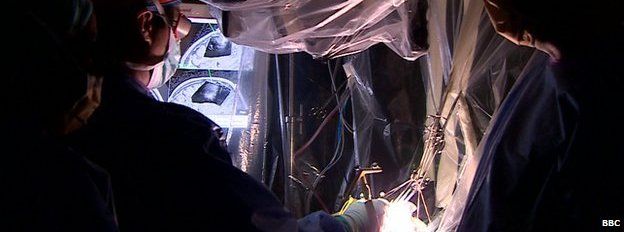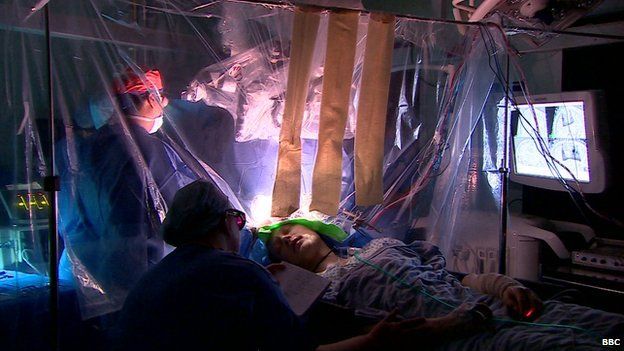Laser detects brain tumour cells during surgery

Fergus WalshMedical correspondent
26 August 2015
From the sectionHealth
145comments
Jump media player
Media player help
Out of media player. Press enter to return or tab to continue.Media captionFergus Walsh reports on the new surgery techniques
Surgeons in London have used lasers to diagnose abnormal tissue during an operation to remove a brain tumour for the first time in Europe.
The non-invasive technique measures light reflected off tissue to determine whether it is cancerous or healthy.
The patient, Reuben Hill, 22, is making a good recovery after the operation at Charing Cross Hospital.
It is hoped the technique could make this kind of delicate surgery faster and more accurate.
It has only been tried in Montreal, Canada, before now.
Mr Hill, who is from Devon and studying for a PhD in physics at Imperial College London, works with the same laser technology as used in his operation.
Before surgery, he told me: "My inner scientist is fascinated by what they are going to do.
"Understanding the physics involved definitely makes it less frightening."
How it works
 Image captionThe laser probe in action
Image captionThe laser probe in actionDuring the operation, surgeons use a near-infrared laser probe, pointing the beam of light on to the exposed brain.
This causes molecules in the cells to vibrate.
Fibre optics in the probe collect the scattered light that bounces off the tissue.
This is analysed using Raman spectroscopy, which can measure the frequency of vibrations.
Healthy and abnormal tissue have a slightly different "signature".
The whole process takes a couple of seconds, and is entirely non-invasive.
In all cancer surgery, the aim is to remove all abnormal tissue while sparing healthy cells.
This is especially important with brain tumours, as removing healthy tissue can cause permanent damage to cognition, memory and speech.
The Raman probe can tell surgeons whether to cut or spare tissue.
At present, they rely on biopsies sent for analysis during the operation, which can take up to 40 minutes each.
'iKnife'
Neurosurgeon Babar Vaqas, the trial chief investigator, said: "Optical technologies like this are the future. They are fast and don't destroy any tissue and could be used during many types of cancer surgery or when dealing with infection like a brain abscess."
Mr Vaqas said the trial at Charing Cross Hospital - part of Imperial College Healthcare NHS Trust - was aiming to recruit between 30 and 40 patients with brain tumours.
During the same operation, surgeons used another innovative technique - an "intelligent" knife that can give a detailed molecular analysis of tissue.
The "iKnife" is an electro-surgical scalpel that produces smoke as it cuts through tissue.
This is sucked into a mass spectrometer next to the operating table, for analysis, telling surgeons what type of abnormality they are dealing with.
Kevin O'Neill, head of neurosurgery at Imperial, said the combination of new technologies would revolutionise brain surgery.
"This is bringing the laboratory into theatre, giving a real-time molecular fingerprint of tissue," he said.
"The potential is amazing, not just to differentiate between normal brain and tumour, but whether the patient is likely to respond to specific treatments".
The team at Imperial began using the iKnife in September 2014 and are also trialling it in breast, colon and ovarian cancer surgery.
Singing patient
Mr Hill was diagnosed with epilepsy and a brain tumour after he was found collapsed in his bedroom.
He said: "It was a big surprise. I was a fit, healthy person and in the judo team."
The golf-ball-sized tumour was near the area of the brain that deals with language and communication.
Mr Hill is part of the choir at Imperial College, and was concerned that the surgery might affect his speech and ability to sing.
Half way through the operation, he was gently woken up and asked to talk - and sing - so that surgeons could be sure that these would not be affected.
A speech therapist worked with Mr Hill as the surgeons removed the last parts of the tumour.
With the lights dimmed, Mr Hill sang these poignant words from the hymn 10,000 Reasons: "Whatever may pass and whatever lies before me, I'll still be singing when the evening comes."
I have witnessed scores of operations over the years, but none like this.
It was a moving culmination to a remarkable piece of surgery.
 Image captionA speech therapist confers with Mr Hill as surgeons remove the last section of his brain tumour
Image captionA speech therapist confers with Mr Hill as surgeons remove the last section of his brain tumourI met Mr Hill two months after his operation, when he was back at Charing Cross Hospital for a follow-up appointment.
Surgeons were able to confirm that his tumour had not been cancerous.
The operation was a complete success, though Mr Hill will need to be monitored regularly in the coming years.
He said he was now well on the road to recovery and looking forward to getting back to his physics PhD next year.
Mr Hill said being ill had given him a new perspective on life, adding that in the future "I'll be remembering just to be happy".
The research at Imperial College is part-funded by the charity Brain Tumour Research.
Chief executive Sue Farrington Smith said: "Advances in brain tumour surgery such as this are very exciting and give hope to the thousands of patients and their families diagnosed with a brain tumour each year."
Sem comentários:
Enviar um comentário